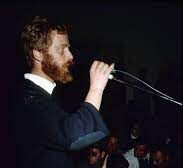The active revisionism of Jean-Gabriel Cohn-Bendit
Noël Mamère, a Green MP, finds himself steadily rebuked, on radio as on television, for his acquaintance with another Green, Jean-Gabriel Cohn-Bendit, the elder brother of “Danny the Red”. He is censured for “Gaby” Cohn-Bendit’s compromising relations, twenty years ago, with revisionists such as Pierre Guillaume, head of La Vieille Taupe (“The Old Mole”), Serge Thion, and Robert Faurisson.
Recently, during a talk programme presented by the prominent television host Thierry Ardisson, Mamère, a former journalist with a ready tongue, regarded as having an answer to everything, was taken aback by this accusation. First he muttered something or other indistinctly. He feigned ignorance. When Ardisson stated that Gaby Cohn-Bendit had in the past “mixed” with the revisionists and, in particular, with “Faurisson, who says that the gas chambers never existed”, he asked him whether that bit of information had been verified at the proper source. Then, thinking he had now found the right answer, he claimed that Gaby Cohn-Bendit, without ever making any revisionist statements, had only gone so far as to take up the defence of the revisionists and of their right to express themselves freely.
Mamère is mistaken. Gaby Cohn-Bendit has made revisionist statements that he might even repeat today were it not for the pressure and the press campaigns which, during an electoral contest in his region in which the Greens were participating, have recently led him to dissociate himself from the revisionists.
Revisionist statements
In the late 1970s and early 1980s, at the beginning of the “Faurisson Affair”, his position on the subject of the Nazi gas chambers, the genocide of the Jews and the number of European Jews who had died because of Nazism could be summed up in these terms:
– There is reason “to doubt”;
– It is appropriate to “accept a debate”
– The reply made to Faurisson by thirty-four historians (among whom Fernand Braudel) is “monstrous”:
– As concerns the facts (an order from Hitler to kill the Jews, gas chambers, figures…), “I am not far from thinking that the revisionists are right”;
– “If the gas chambers’ existence may be doubted it is because it is supported only by witnesses’ accounts (confessions, memoirs, court testimonies) and because these accounts are contradictory in themselves and between one another, as I have shown in regard to [Johann-Paul] Kremer [SS physician at Auschwitz]”;
– “Let’s fight, therefore, for the destruction of the gas chambers that are shown to the tourists in those camps where it’s now known there were none, lest we not be believed as regards what we are sure of. The Nazis had model camps to show to the good souls of the Red Cross; let’s not go and do the opposite”;
– “I will not accept that what I refuse to do, even to the Neo-Nazis, should be done to men like Rassinier or Faurisson, who I know have nothing in common with them, and the case being brought against Faurisson reminds me more of the Inquisition than of a struggle against the return of evil.”
If Gaby Cohn-Bendit did keep his distance from the revisionists it was in writing that “without a gas chamber, without an order to exterminate, simply with an order to deport to ghettos, to camps, all of which were places of death”, there had been a form of extermination comparable to that of the Red Indians by the Whites in America, the Armenians by the Turks or the Crimean Tartars by Stalin.
Freedom for the revisionists
Gaby Cohn-Bendit indeed pleaded in favour of the revisionists’ freedom of expression but he did so with a strength and a self-assurance that were obviously drawn from the conviction that they had raised a real historical problem, a problem, he wrote, that “the historian cannot dismiss”. For his part, he concluded that he believed less in a genocide (an unprecedented extermination, ordered, programmed, supervised), in the gas chambers and in the six million than in a deportation that, in the event, had led to an extermination like those already known to History.
Source
If Noël Mamère cares to verify at the source this summing up of the position taken by his friend Gaby Cohn-Bendit in 1979-1981 on the “problem” of the gas chambers, the genocide and the six million, he can refer to a collective work published in 1981 under the title Intolérable Intolérance.[1] Its authors, in alphabetical order, were Jean-Gabriel Cohn-Bendit (p. 12-29), Éric Delcroix (Robert Faurisson’s lawyer), Claude Karnoouh (CNRS, “National Centre for Scientific Research”), professor Vincent Monteil, and Jean-Louis Tristani (CNRS). The book presented itself as an “assemblage of texts in the form of a petition to their Honours the Judges of the Paris Court of Appeal”. Coupling action with his words, Gaby Cohn-Bendit had the courage to come forward as a “voluntary third-party appearer” (with Serge Thion, Jacob Assous, Gabor Tamas Rittersporn, Pierre Guillaume and others) alongside and in support of Robert Faurisson, both in first instance and on appeal, in the case brought against Faurisson by a whole set of associations, among which the LICRA, “International League against Racism and Antisemitism”. On April 26, 1983 the first chamber of the Paris Court of Appeal naturally found Faurisson liable for his dangerous nature but acknowledged the seriousness of his work on “the problem of the gas chambers”; the Court held that it must, consequently, be permitted to one and all to say that the Nazi gas chambers had or had not existed. Gaby Cohn-Bendit had played a part in this victory of Faurisson’s.[2]
November 12, 1999
_______________
[1] Published by Éditions de la Différence in 1981, this book may be obtained from P. Guillaume, BP 9805, 75224 Paris Cedex 05.
[2] For the terms of his disavowal of revisionism, see Gaby Cohn-Bendit, Nous sommes en marche, Flammarion, Paris 1999, p. 235-245.

